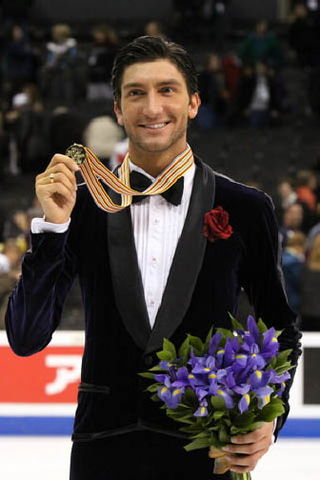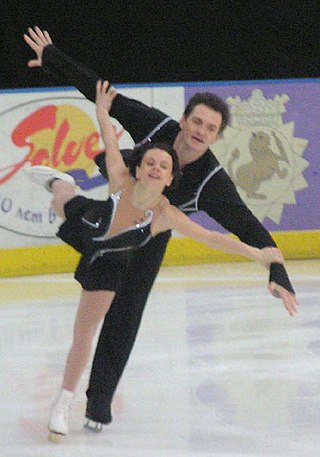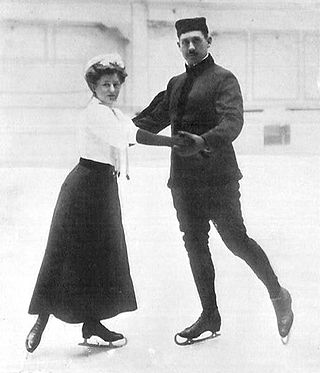
Speed skating is a competitive form of ice skating in which the competitors race each other in travelling a certain distance on skates. Types of speed skating are long-track speed skating, short-track speed skating, and marathon speed skating. In the Olympic Games, long-track speed skating is usually referred to as just "speed skating", while short-track speed skating is known as "short track". The International Skating Union (ISU), the governing body of competitive ice sports, refers to long track as "speed skating" and short track as "short track skating". Long track speed skating takes place on a 400m ice track, while short track takes place on a 111m track.

Ice dance is a discipline of figure skating that historically draws from ballroom dancing. It joined the World Figure Skating Championships in 1952, and became a Winter Olympic Games medal sport in 1976. According to the International Skating Union (ISU), the governing body of figure skating, an ice dance team consists of one woman and one man.

Michelle Wingshan Kwan is a retired American competitive figure skater and diplomat serving as United States Ambassador to Belize. In figure skating Kwan is a two-time Olympic medalist, a five-time world champion and a nine-time U.S. champion. She is tied with Maribel Vinson for the all-time National Championship record.
Skate punk is a skater subculture and punk rock subgenre that developed in the 1980s. Originally a form of hardcore punk that had been closely associated with skate culture, skate punk evolved into a more melodic genre of punk rock in the 1990s similar to pop punk. Since then, it has predominately featured fast tempos, lead guitar playing, fast drumming, and singing. Occasionally, skate punk also combines the fast tempos of hardcore punk and melodic hardcore with the catchy hooks of pop-punk.

The World Figure Skating Championships, commonly referred to as "Worlds", are an annual figure skating competition sanctioned by the International Skating Union. Medals are awarded in men's singles, women's singles, pair skating, and ice dance. Generally held in March, the World Championships are considered to be the most prestigious of the ISU Figure Skating Championships. With the exception of the Olympic title, a world title is considered to be the highest competitive achievement in figure skating.

Evgeni Viktorovich Plushenko is a Russian former figure skater. He is a four-time Olympic medalist, a three-time World champion, a seven-time European champion, a four-time Grand Prix Final champion, and a ten-time Russian national champion. Plushenko's four Olympic medals once tied with Sweden's Gillis Grafström's record for most Olympic medals in figure skating, which has since been surpassed by Scott Moir and Tessa Virtue. He also won a record total of 22 titles on the Grand Prix circuit.

Alexandra Pauline "Sasha" Cohen is a retired American figure skater. She is the 2006 Olympic silver medalist, a three-time World Championship medalist, the 2003 Grand Prix Final Champion, and the 2006 U.S. Champion. She is known for her artistry, flexibility and body lines, and musical interpretation. As of 2024, Cohen is the most recent American woman to medal individually in figure skating at the Olympics.

John Garvin Weir is an American television commentator and retired figure skater. He is a two-time Olympian, the 2008 World bronze medalist, a two-time Grand Prix Final bronze medalist, the 2001 World Junior Champion, and a three-time U.S. National champion (2004–2006). He was the youngest U.S. National champion since 1991, in 2006 the first skater to win U.S. Nationals three times in a row since Brian Boitano in the late 1980s, and the first American to win Cup of Russia in 2007.

Evan Frank Lysacek is an American retired figure skater. He is the 2010 Olympic champion, the 2009 World champion, a two-time Four Continents champion, the 2009 Grand Prix Final champion, and a two-time U.S. national champion. Lysacek was the 2010 United States Olympic Committee's SportsMan of the Year, and the winner of the James E. Sullivan Award as the top U.S. amateur athlete of 2010. On January 22, 2016, he was inducted into the U.S. Figure Skating Hall of Fame.

Maria Igorevna Petrova is a Russian pair skater. With partner Alexei Tikhonov, she is the 2000 World champion and a two-time European champion

The Four Continents Figure Skating Championships (4CC) is an annual figure skating competition. The International Skating Union established it in 1999 to provide skaters representing non-European countries with a similar competition to the much older European Figure Skating Championships. The event's name refers to the Americas, Africa, Asia and Oceania. Medals are awarded in the disciplines of men's singles, women's singles, pairs, and ice dance.

Yuna Kim, also credited in eastern name order as Kim Yuna or Kim Yeon-a, is a South Korean figure skater. Known for her well-rounded skills, achievements, popularity, and impact on the sport, she is one of the most highly recognized athletes in South Korea and regarded as one of the greatest figure skaters in history, being commonly referred to as "Queen Yuna". Kim started skating at five years old and competed in women's singles from 2001 to 2014. She is the 2010 Olympic champion, the 2014 Olympic silver medalist, a two-time World champion the 2009 Four Continents champion, a three-time Grand Prix Final champion, the 2006 World Junior champion, the 2005 Junior Grand Prix Final champion, and a six-time South Korean national champion.

Skate America is an annual international figure skating competition held as part of the ISU Grand Prix of Figure Skating. It is organized by U.S. Figure Skating. Medals may be awarded in men's singles, women's singles, pair skating, and ice dance.

Pair skating is a figure skating discipline defined by the International Skating Union (ISU) as "the skating of two persons in unison who perform their movements in such harmony with each other as to give the impression of genuine Pair Skating as compared with independent Single Skating". The ISU also states that a pairs team consists of "one Woman and one Man". Pair skating, along with men's and women's single skating, has been an Olympic discipline since figure skating, the oldest Winter Olympic sport, was introduced at the 1908 Summer Olympics in London. The ISU World Figure Skating Championships introduced pair skating in 1908.

The Rostelecom Cup, previously known as the Cup of Russia, was an annual international figure skating competition held as part of the ISU Grand Prix of Figure Skating. It was organized by the Figure Skating Federation of Russia. Medals were awarded in men's singles, women's singles, pair skating, and ice dance.

The Grand Prix de France is an annual international figure skating competition held as part of the ISU Grand Prix of Figure Skating. It is organized by the French Federation of Ice Sports. It was previously known as the Grand Prix International de Paris (1987–93), the Trophée de France, the Trophée Lalique (1996–2003), the Trophée Éric Bompard (2004–15), and the Internationaux de France. Medals are awarded in men's singles, women’s singles, pair skating, and ice dance.

The World Junior Figure Skating Championships, commonly referred to as "World Juniors" or "Junior Worlds", are annual figure skating competitions sanctioned by the International Skating Union in which figure skaters within a designated age range compete for the titles of World Junior Champion.

The Nebelhorn Trophy is an annual international figure skating competition organized by the Deutsche Eislauf-Union and held in Oberstdorf, Germany. In most years, the event is part of the ISU Challenger Series. The competition is named after the Nebelhorn, a nearby mountain. Medals may be awarded in men's singles, women's singles, pair skating, and ice dance. The Fritz-Geiger-Memorial Trophy is presented to the team with the highest placements across all disciplines.

The 2006 Skate America was the first event of six in the 2006–07 ISU Grand Prix of Figure Skating, a senior-level international invitational competition series. It was held at the Hartford Civic Center in Hartford, Connecticut on October 26–29. Medals were awarded in the disciplines of men's singles, ladies' singles, pair skating, and ice dancing. Skaters earned points toward qualifying for the 2006–07 Grand Prix Final.
The 2006–07 ISU Junior Grand Prix was the tenth season of the ISU Junior Grand Prix, a series of international junior level competitions organized by the International Skating Union. It was the Junior-level complement to the 2006–07 ISU Grand Prix of Figure Skating, which was for Senior-level skaters. Skaters compete in the disciplines of men's singles, ladies' singles, pair skating, and ice dance. The top skaters from the series met at the Junior Grand Prix Final.